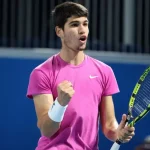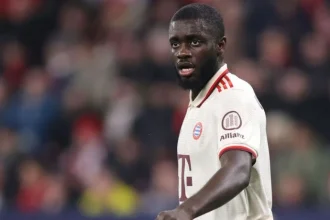On Wednesday evening, the contrast between the two women walking into Arthur Ashe Stadium could hardly be more striking. One is an introverted, emotionally resilient American making a career-best run at her home Slam. The other, a Polish Grand Slam juggernaut with six major titles, including the most ruthless performance of the 2025 season.
Amanda Anisimova and Iga Swiatek will meet in a US Open quarterfinal thick with narrative tension—one heavy with the weight of redemption, the other cool with the clarity of purpose.
The Underdog’s Ascent
Amanda Anisimova, now 24, has always carried the burden of brilliance. Once labeled a prodigy, her early promise was followed by a series of personal and professional struggles—injury, loss, and a much-publicized mental health hiatus. Her comeback hasn’t been flashy, but it’s been deeply human. Ranked No. 8, she’s into her first US Open quarterfinal after years of ups and downs. Her journey has made her not just a player to watch, but one to root for.
This is the farthest she’s ever gone in the Flushing Meadows main draw. “It really means a lot,” Anisimova said after her fourth-round win over Beatriz Haddad Maia. “It’s the city, there’s a lot going on. And being a home Slam, there’s pressure on American players. But I’ve really tried to embrace it.”
That effort shows. Anisimova has played with clarity and conviction this fortnight, her backhand as unshakable as ever, her serve improved, her poise unmistakable. But what looms now is not just another match—it’s a rematch, and an emotional reckoning.
The Ghost of Wimbledon
Two months ago, Anisimova walked off Centre Court at Wimbledon having lost a Grand Slam final 6-0, 6-0. Her opponent? Iga Swiatek. The scoreline sparked criticism, commentary, even pity—but not from Anisimova. In the aftermath, her runner-up speech was composed, heartfelt, and disarmingly honest. If defeat revealed character, she passed the test with grace.
But she hasn’t leaned into the narrative of “revenge.”
“I don’t think it helped me become a better player in any way,” she said of that loss. “It wasn’t a good performance by any means. I learned some things. But above all, I think it was just a learning experience.”
She’s right to downplay it. Not because it wasn’t traumatic—losing a Slam final without winning a game is a scar few players carry—but because she refuses to let it define her.
The Relentless Champion
Swiatek, meanwhile, remains unsentimental. She declined to comment on the quarterfinal match-up before Anisimova had officially advanced. “There’s no point now for me to overthink who I’m going to play,” she said. “I’ll prepare.”
That’s Iga. She doesn’t do drama. She does dominance.
The Wimbledon final may have sparked uncomfortable conversations about sportsmanship, but Swiatek has little time for such framing. “Most of us were raised that way—to win every point,” she explained. “When you don’t play sports, you don’t get it. But if you do, then you know you’re not going to give anything for free.”
That mentality has made her a six-time Slam champion, a former world No. 1, and the most complete player on the WTA Tour. She’s not here for applause—she’s here for wins.
Still, she acknowledges the US Open is a different beast. “It’s harder to focus here,” Swiatek admitted. “At Wimbledon you don’t have it—the lights, the intros, the reminders of everything you’ve won. Here, it’s louder. It’s bigger.”
And it will be especially loud Wednesday night. The 23,000-plus in Ashe will almost certainly be behind Anisimova. Sentiment will swell, support will roar. New York loves a comeback story.
Tactical Tug-of-War
On court, the match promises to be a battle of pace and pressure. Swiatek will aim to take time away from Anisimova, yanking her off the baseline with heavy topspin forehands and angling her into uncomfortable positions. Her movement will be a clear advantage, as it is against almost everyone on tour.
Anisimova, in turn, will look to hold her ground, dictate with her forehand, and lean on that world-class backhand to take early control of rallies. Her serve—once a liability—is now a weapon she hopes can fend off Swiatek’s aggressive returning.
Statistically, the two are evenly matched in many key metrics, but the truth is, this match won’t be decided by numbers. It will hinge on moments—break points saved, nerves held, and courage summoned.
The Stage and the Stakes
Anisimova knows what this match represents. “It’s going to be a really tough challenge,” she said. “But I feel like I’ve been playing well.”
Swiatek has been here before. Ten Grand Slam quarterfinals. One US Open title. A resume so stacked it almost dulls the urgency. Almost.
One player will be chasing glory. The other, healing. One will be cheered for her resilience, the other tested for her resolve. Both, in their own way, already victorious. But only one will take another step closer to the trophy.
On Wednesday night, under the lights of Arthur Ashe, it won’t just be a tennis match. It’ll be a test of will, of growth, of what it means to face your past and hit through it—again and again.














